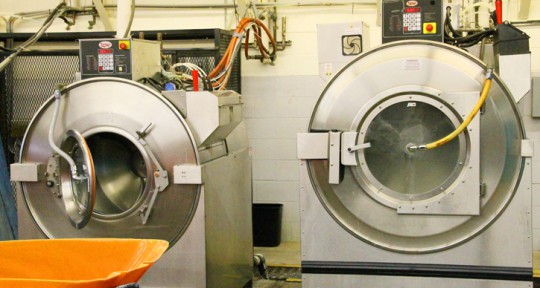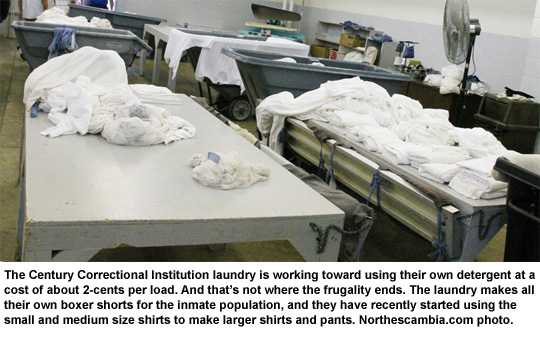Dishpan Hands, Homespun Bedsheets In Prison Cost Cutting Plan
September 30, 2013
Florida inmates are sewing their own clothes and will soon start washing dishes by hand in sinks they’ve built themselves.
It’s all part of Department of Corrections Secretary Mike Crews’ attempt to whittle a nearly $50 million deficit in this year’s $2.1 billion budget.
Crews told the Senate Criminal and Civil Justice Appropriations Subcommittee on Wednesday that he’s on a cost-cutting mission to reduce the deficit, which stems from issues such as health care costs.
Thus far, Crews said he’s saved nearly $900,000 by re-bidding the agency’s contract for paper towels and toilet paper, about $254,000 by de-privatizing pest control services and more than $500,000 by buying used cars for probation officers, thus doing away with mileage reimbursements. The agency also saved about $600,000 through consolidating office leases.
DOC also saved $18 million by getting federal assistance for HIV-AIDS medications, $3.5 million with a new drug formulary for some medications and $1.4 million by changing inhaler protocols, Crews said.
Mothballing kitchen equipment in the state’s aging prisons won’t just give inmates dishpan hands — it’s another way Crews plans to scrimp.
Crews said dishwashers “are starting to tear up” and are expensive to repair. Instead of purchasing three-sink combos required for safe scrubbing, Crews said his staff suggested that they could build the sinks themselves, possibly with inmate assistance.
 Meanwhile, the prisoners have also started to sew their own uniforms as well as their bedclothes, Crews said.
Meanwhile, the prisoners have also started to sew their own uniforms as well as their bedclothes, Crews said.
“Sometimes when you ride by it looks like Fred Sanford’s house. We actually hang the clothes out to dry,” Crews, who in December became the sixth secretary in six years at the agency.
What seems like small-change savings given the size of the red ink “may seem miniscule, but I do want the committee to understand we’re doing everything we can to help and get us out of this deficit,” Crews said.
Crews expects an update on the projected deficit, now estimated at $45.4 million, in two weeks. That’s less than half of November’s projected $119 million deficit, thanks to about $43 million from the Legislature, a hiring freeze and a high vacancy rate due to turnover.
Crews said the agency was responsible for at least part of the deficit by failing to control health-care costs. DOC has contracted with two private firms, Corizon and Wexford, to provide health care and, the agency hopes, keep in check spending on services for an aging prison population as well as ailing inmates. The outsourcing is supposed to be completed Oct. 13 and is expected to save between $40 million and $50 million annually, Crews said.
But Crews blamed some of the deficit on factors beyond his control, including bid protests, a nine-month legal challenge to the health care privatization and a dispute over the broader privatization of more than half of the state’s prisons approved by lawmakers two years ago but later overturned by the courts.
The department achieved some savings by shuttering 10 prisons in recent years but held off on closing Glades Correctional Institution in 2012 for more than six months because of lawmakers’ and local community leaders’ concerns about the impact on an already blighted economy. The delay added more than $6.7 million to the deficit, Crews explained.
Extra overtime costs caused by switching to 12-hour daily shift and bid protests also contributed to the deficit, Crews said.
Subcommittee Chairman Rob Bradley, R-Fleming Island, said the agency’s budget has been slashed by more than $484 million over the last five years, even though the inmate population has gone up.
“We didn’t get here overnight and we’re not going to cure it overnight,” Bradley said of the deficit.
Sen. Thad Altman, R-Viera, suggested saving money by again considering the controversial privatization plan pushed by Gov. Rick Scott.
“I’m not disparaging those that are there working. We need them. But when NASA wants to service the international space station they turn to the private sector. When we landed a man on the moon that was a private company. I think our governor’s right on target,” Altman said.
But Democratic Sen. Jeff Clemens of Lake Worth suggested lawmakers could generate bigger savings by sending fewer inmates to prison in the first place, especially those with addiction problems.
Bradley agreed, saying the majority of inmates convicted of drug-related crimes spend less than two years behind bars.
“They’re not getting treatment. They’re being housed. And I don’t know how smart that is,” Bradley said.
by Dara Kam, The News Service of Florida
NorthEscambia.com photos, click to enlarge.
Comments
8 Responses to “Dishpan Hands, Homespun Bedsheets In Prison Cost Cutting Plan”




@ Puddin – many prisons already farm and plant for food. Has been for decades and still do.Many people really dont know just what they do accomplish as far as being self dependent.
Killer rehab….when they get out they can put on their resume..did prison time and I make a nifty shirt and wash a mean sheet.
Get real..they will be back with those type skills that we are bragging about in cost savings. It will cost more their second time around or their 3rd with ” cost savings”
Must have been a Florida 1 minute think tank that come up with programs that would deter prisoners washing facilities.
Not impressed with the bragging rights on this.
Makes good headlines though to make those looking at this think it was not already going on.
@ just saying:
Get real! They are working for their keep. They wear what they make and sleep on the sheets, etc. that they launder. Not to mention the feeling of satisfaction of actually accomplishing something during their day! If they sit and do nothing, how are they any better off than they were before? At least the work reduces idle hands and they don’t have as much time to get into trouble or sink into depression. Work is good for them!
Awesome now we have a warehouse full of slaves. How is this going to change what happens once they are released?
Gee, that takes all the fun out of being incarcerated.
Awesome! Now how about having them grow thier own fresh fruits and veggies too.
Sounds like Mr. Crews is doing a very good job, others could learn to cut back also. I agree with Dem. Sen. Jeff Clemens that prisoners with drug problems need help.
This sounds like a good idea. This way they are doing something instead of just sitting around on my dime. It is not hard work.
Me, venting